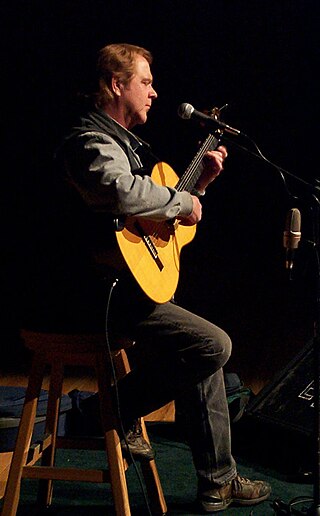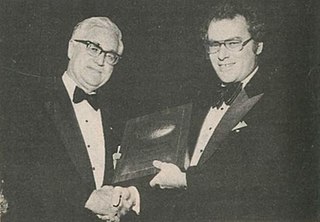Related Research Articles

Ian & Sylvia were a Canadian folk and country music duo which consisted of Ian and Sylvia Tyson. They began performing together in 1959, married in 1964, and divorced and stopped performing together in 1975.

Michael Jay Johnson was an American pop, country, and folk singer-songwriter and guitarist. He is best remembered for his 1978 hit song "Bluer Than Blue". He charted four hits on the Billboard Hot 100 chart and nine more on Hot Country Songs, including two number one country hits in 1986's "Give Me Wings" and "The Moon Is Still Over Her Shoulder". He also co-wrote "Cain's Blood", the debut single of 1990s country group 4 Runner.

Chilliwack is a Canadian rock band centered on the singer and guitarist Bill Henderson. They were active from 1970 to 1988; Henderson re-formed the band in 1997. The band started off with a progressive rock sound that incorporated elements of folk, indigenous, jazz and blues, before moving towards a more straight-ahead hard rock/pop rock sound by the mid-1970s. Their six best-selling songs were "My Girl ", "I Believe", "Whatcha Gonna Do", "Fly at Night", "Crazy Talk" and "Lonesome Mary". The band's line-up has changed many times.
Len is a Canadian alternative rock duo based in Toronto, Ontario. The band consists of siblings Marc Costanzo and Sharon Costanzo and a revolving lineup of touring and studio musicians. The group is best known for their 1999 single "Steal My Sunshine".

The Chambers Brothers is an American psychedelic soul band, best known for their eleven-minute 1968 psychedelic soul hit "Time Has Come Today". The group was part of the wave of new music that integrated American blues and gospel traditions with modern psychedelic and rock elements. Their music has been kept alive through frequent use in film soundtracks. There were four brothers, though other musicians were also in the group.
Roy Charles Forbes is a Canadian folk music singer-songwriter, whose music bears heavy influences from classic American genres of acoustic blues and traditional country. Forbes is known for his high soulful voice and percussive guitar playing.

Love It to Death is the third studio album by American rock band Alice Cooper, released on March 9, 1971. It was the band's first commercially successful album and the first album that consolidated the band's aggressive hard-rocking sound, instead of the psychedelic and experimental rock style of their first two albums. The album's best-known track, "I'm Eighteen", was released as a single to test the band's commercial viability before the album was recorded.
The Mercey Brothers were a Canadian country music group active from 1957 to 1989. The brothers were seven-time Juno Award winners for "The Top Country Group" and were inducted into the Canadian Country Music Hall of Fame.

Morris "Moe" Koffman, OC was a Canadian jazz saxophonist and flautist, as well as composer and arranger. During a career spanning from the 1950s to the 2000s, Koffman was one of Canada's most prolific musicians, working variously in clubs and sessions and releasing 30 albums. With his 1957 record Cool and Hot Sax on the New York–based Jubilee label, Koffman became one of the first Canadian jazz musicians to record a full-length album. Koffman was also a long-time member of Rob McConnell's Boss Brass.

"Jive Talkin'" is a song by the Bee Gees, released as a single in May 1975 by RSO Records. This was the lead single from the album Main Course and hit number one on the Billboard Hot 100; it also reached the top-five on the UK Singles Chart in the middle of 1975. Largely recognised as the group's comeback song, it was their first US top-10 hit since "How Can You Mend a Broken Heart" (1971).

Hugh Hagood Hardy, was a Canadian composer, pianist, and vibraphonist. He played mainly jazz and easy listening music. He is best known for the 1975 single, "The Homecoming" from his album of the same name, and for his soundtrack to the Anne of Green Gables and Anne of Avonlea films.
Ian Campbell Thomas is a Canadian singer, songwriter, actor and author. He is the younger brother of comedian and actor Dave Thomas. He was born in Hamilton, Ontario, Canada.

"Signs" is a song by the Canadian rock group Five Man Electrical Band. It was written by the band's frontman, Les Emmerson, and popularized the relatively unknown band, who recorded it for their true first album, Good-byes and Butterflies, in 1970. The LP Five Man Electrical Band had begun as a Staccatos album with Brian Rading, the band's bassist suggesting the band's new name from the song title.

"I'm Eighteen" is a song by rock band Alice Cooper, first released as a single in November 1970 backed with "Is It My Body". It was the band's first top-forty success—peaking at number 21—and convinced Warner Bros. that Alice Cooper had the commercial potential to release an album. The song and its B-side feature on the band's first major-label album Love It to Death (1971).
Colleen Susan Peterson was a Canadian country and folk singer, who performed both as a solo artist and as a member of the band Quartette.

The Bells, a.k.a. The Five Bells, were a Canadian soft rock band from Montreal, Quebec, active from 1964 to 1974. They released five albums and several singles, two of which were major hits in the early 70s, "Fly Little White Dove Fly" and especially "Stay Awhile".

"Can You Please Crawl Out Your Window?" is a folk rock song written by American musician Bob Dylan. In 1965, Columbia Records released it as a single, which reached number 58 on the US Billboard Hot 100 chart, and number 17 on the UK chart in January 1966. While Dylan never included the song on any of his studio albums, it appears on compilations, such as Biograph and Side Tracks.
Myles and Lenny were a Canadian folk-pop music group based in Toronto, Ontario. most active during the 1970s.

The Owl and the Pussycat is the soundtrack album to the 1970 American film of the same name. Released by Columbia Records, it features film dialogue by Barbra Streisand and George Segal recorded over music performed by American band Blood, Sweat & Tears. The album's five tracks were all written by Buck Henry, produced by Thomas Z. Shepard.
Spice, originally Sugar & Spice, was a Canadian pop and folk band based in Winnipeg, Manitoba, active from 1967 to 1973.
References
- ↑ Richard Lemm (1999). Milton Acorn: In Love and Anger. McGill-Queen's Press - MQUP. pp. 185–186. ISBN 978-0-88629-340-6.
- ↑ M. Sell (30 November 2010). Avant-Garde Performance and Material Exchange: Vectors of the Radical. Palgrave Macmillan UK. pp. 134–. ISBN 978-0-230-29894-1.
- 1 2 "Dream Times: The Perth County Conspiracy …Does Not Exist". Inside the Music. November 6, 2011. Canadian Broadcasting Corporation . Retrieved October 29, 2014.
- ↑ "Perth County Conspiracy | Interview | Terry Jones" (Interview). It's A Psychedlic Baby magazine. 10 December 2022. Retrieved 19 September 2024.
- ↑ Canada and the World. 1970. p. 99.
- ↑ Ellen Stafford (1972). Stratford Around and about . Fanfare Books. pp. 69–71.
- ↑ "RPM Top 100 Singles - March 20, 1971" (PDF).
- ↑ "RPM Top 100 Singles - January 22, 1972" (PDF).
- ↑ Ritchie Yorke (1 August 1970). "Columbia Records in Canadian Talent Drive". Billboard. Nielsen Business Media, Inc. pp. 57–. ISSN 0006-2510.
- ↑ "Inside the Music- Dream Times: The Perth County Conspiracy …Does Not Exist.". CBC Radio: Inside the Music, November 6, 2011
- ↑ "Perth County Conspiracy Alive". AllMusic Review by Richie Unterberger
- ↑ "Conspiracy Cuts LP in Church". Billboard. Nielsen Business Media, Inc. 13 March 1971. pp. 54–. ISSN 0006-2510.
- ↑ "RPM Top 100 Albums - February 27, 1971" (PDF).
- ↑ "RPM Top 100 Albums - January 22, 1972" (PDF).